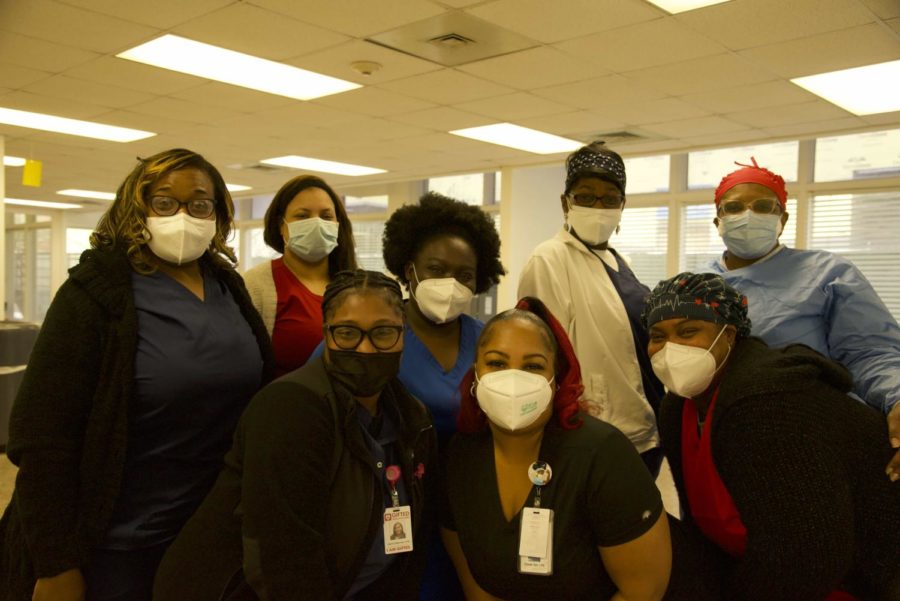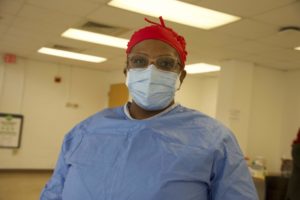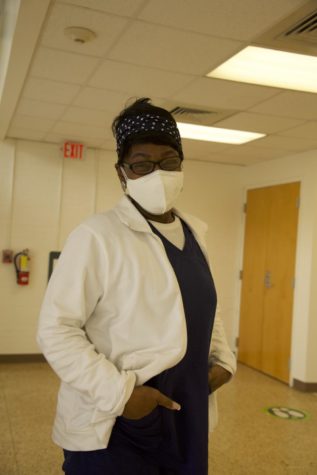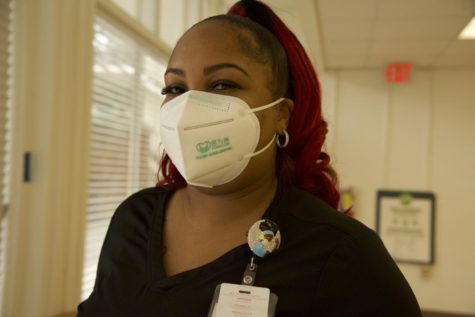Through grief, Tulane nurses find joy on frontlines

Sharon Magee knows heartbreak. Some days, at the hospital where she works, COVID-19 patients have arrived and died before her shift ended.
All the grief often left her in tears.
So when she got the chance to work part-time as a COVID-19 tester at Tulane University, she took it.
“I had to take a minute to breathe,” she said.
Magee is one of eight nurses at Tulane’s Uptown testing center. Most of them have been there since it opened in August 2020. Many of them are mothers. Some have lost family members.
They are one link in a longer chain of lab workers, couriers and Campus Health staff who make Tulane’s testing program possible. Like nurses nationwide, they are still on the frontlines of the unpredictable pandemic — tired of COVID-19 but determined to keep fighting it.
The testing center is quieter lately, despite the persistence of the omicron variant and Tulane’s 6.1% positivity rate. On the slow days, the nurses sit chatting or scrolling their phones. Lines rarely form over the faded floor stickers calling for social distancing. A biohazard box the nurses converted into an umbrella holder for visitors is empty.
January 2022 looked nothing like January 2021.
But the danger is still here. Magee, who has two children and is in nursing school, faces COVID-19 symptom checks at her school and her children’s doctors office. When the symptom-checker asks her if she has come in contact with a positive person in the last 14 days, her answer is always yes.

She remains vigilant.
“I was offended as a nurse when the city took away the mask mandate,” Magee said. “They’re not taking it seriously enough.”
“It doesn’t hurt you to keep that in place,” she said. “What is the hurt in saying ‘You come in here, you need to have on a mask?’”
She still works at the hospital — usually only one weekend shift. Her weekdays are spent in the testing center — three days a week — and classes on the other two. She graduates in May.
Dora Coleman is busy, too. A nurse by training, she started working at Tulane in January 2021. She said the students are her favorite part of the job.
“I love it when they say thank you,” she said. “That melts my heart.”
Coleman is a self-described “worker” and said she needs things done right on her shifts. But she is not above fun — she sometimes sings on the job. During a rendition of Carole King’s “You’ve Got a Friend,” a student started singing with her.
“The kids make my day,” she said.

Those days start early. Coleman said she gets up around 5 a.m.
Chante Carr, one of the lead nurses in the center, said she wakes up at 5:45 a.m. Carr gets her three children to school, then comes to the testing center to make sure the scanners and printers work each morning. On rainy days, the nurses sometimes have to move the test stations around because of leaks.
The day ends at 4:30 p.m. Carr spends more time at the testing center than she does with her kids.
Adapting to change is normal here. The testing center’s first location was in Paterson Hall before moving to the first floor of Phelps Hall in September 2020. Multiple COVID-19 variants, two major hurricanes — two years on, the nurses have learned to go with the flow.
“It’s a lot of up and down,” Carr said. “[It’s] about knowing what’s best for everybody.”
But she said knowing she is helping is her favorite part.
“Y’all being appreciative keeps me with a job,” she said.
There is still hardship. Two days before Carr’s birthday, her mother passed away. Her coworkers still celebrated with her, and a student baked her cookies.
Carr kept working after her mother’s death, despite her boss’ offers of time off.
Coleman said she does not usually celebrate. When her father was buried on her birthday this year, though, staff consoled her and brought cake.
Coleman was emotional talking about her father’s death and her co-workers’ support.
“It made me really happy,” she said. “I cried.”
The nurses look out for their students too. Magee’s experiences with the sometimes daily deaths at the hospital are why she counsels COVID-19 safety to people who pass through the center.
“Now I’m on a different end,” Magee said, “so I can give you my little two cents.”

Her hope, she said, is that if even one student takes her advice and tells their friends, maybe it will help stop the spread for good.
But COVID-19 is not the only thing on their minds. Coleman takes care of plants — her aloe vera and cactus. Magee has family movie nights on Fridays. Carr runs a small business selling baked goods.
And on her shirt, near her heart, she wears a bedazzled pin of a nurse flexing her muscles.
Your donation will support the student journalists of Tulane University. Your contribution will allow us to purchase equipment and cover our annual website hosting costs.


